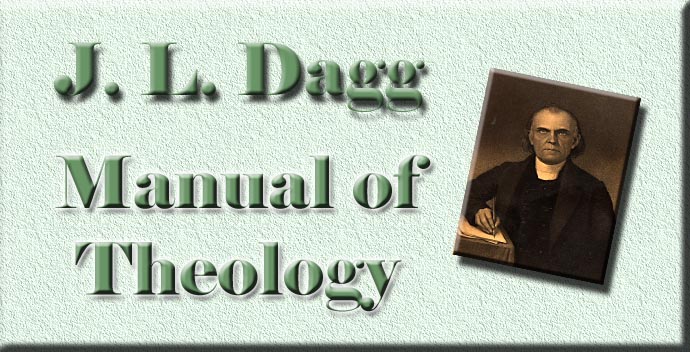
Manual of Theology
By J. L. Dagg
Book Sixth - Doctrine Concerning the Holy Spirit
|
Chapter 1
Personality of the Holy Spirit THE HOLY SPIRIT IS A PERSON, DISTINCT FROM THE FATHER AND THE SON.[1]
The Holy Spirit is a person, and not a mere influence or operation. This may
be proved by the following arguments:
1. When Christ promised his coming as another Comforter, the language clearly
refers to him as a person: "I will pray the Father, and he shall give you
another Comforter that he may abide with you."[2] "The Comforter whom the Father will send in my name, he
shall teach you."[3]
2. Things are, in the Holy Scriptures, attributed to the Holy Spirit, which
can be true only of a person: "He divideth to every man severally as he
will;"[4] "Separate me Barnabas and Saul for the
work whereunto I have called them;"[5] "Why hath
Satan filled thine heart to lie to the Holy Ghost;"[6] "Grieve not the Holy Spirit."[7]
3. The commission given to the apostles required them to baptize in the name
of the Father, and of the Son, and of the Holy Ghost.[8] A mere influence or virtue, could not thus be associated
with the Father and the Son; nor would it accord with the language of
Scripture, to speak of the name of an influence; or with the analogy of
faith, to administer baptism in the name of an influence. In the apostolical
benediction, the Holy Spirit is connected, in a similar manner, with the Father
and the Son: "The grace of our Lord Jesus Christ, the love of God, and the
communion of the Holy Ghost, be with you all."[9] In 1 Cor. xii. 4--6, the Holy Spirit is introduced,
together with God the Father, and the Lord Jesus Christ, as a personal
agent equally with them.
To these arguments, it may be opposed, that the Scriptures frequently use the
words Spirit, Holy Spirit, to denote divine influence. But it is very common,
in language, for an influence to be designated by the name of the source from
which it emanates. We say: "This plant thrives in the shade; that, in the
sun;" but by the word sun, we mean, not the body of the luminary, but the light
and heat emanating from it. So, when it is said: "He will report that God is
in you of a truth,"[10] the general omnipresence
of God is not meant; for this is equally true of all persons and places. A
peculiar presence, implying special divine influence, is intended. It would be
improper to argue from this passage, that God is nothing but an
influence; and it is, in the same manner improper to argue that the Holy
Spirit is not a person, because the name is used in the Scriptures for the
influence which he, as a personal agent, exerts.
The frequency with which the name is used to denote the influence exerted, may
perhaps be accounted for, from the fact, that the name is given to the agent,
because of his influence. It cannot denote anything peculiar in the nature of
the agent; for the first and second persons in the Godhead, are, in their
nature, spirit, and holy, as truly as the third. The name must, therefore, be
regarded as distinguishing him with reference to his operation. He is called
holy, because he is the immediate agent in the production of holiness; and he
is called the Spirit, the Spirit of God, because he is the immediate agent in
exerting the invisible, life-giving, divine influence which proceeds from
God.
The Holy Spirit is distinct from the Father and the Son. The same passages
which prove his personality prove this also. He could not be another
Comforter, if he were not distinct from the Father. In the commission to
baptise, and in the benediction, his personality is not more manifest
than the distinction from the Father and the Son, with whom he is named. |
|
 |
 |
|
[1] Isaiah xlviii. 16; Matt. iii. 16; John xiv. 16, 26; xvi. 7; Acts x. 19, 20; xiii. 2; xv. 28; xx. 28; Eph. iv. 30; Matt. xxviii. 19. [2] John xiv. 16. [3] John xiv. 26. [4] 1 Cor. xii. 11. [5] Acts xiii. 2. [6] Acts v. 3. [7] Eph. iv. 30. [8] Matt. xxviii. 19. [9] 2 Cor. xiii. 14. [10] 1 Cor. xiv. 25. |
|
-
Site Navigation
- ►
 Home
Home - ►
 What's New
What's New - ►
 Bible
Bible - ►
 Photos
Photos - ►
 Hiking
Hiking - ►
 E-Books
E-Books - ►
 Genealogy
Genealogy - ►
 Profile
Free Plug-ins You May Need
Profile
Free Plug-ins You May Need
- ►
 Get Java
Get Java - ►
.png) Get Flash
Get Flash - ►
 Get 7-Zip
Get 7-Zip - ►
 Get Acrobat Reader
Get Acrobat Reader - ►
 Get TheWORD
Get TheWORD